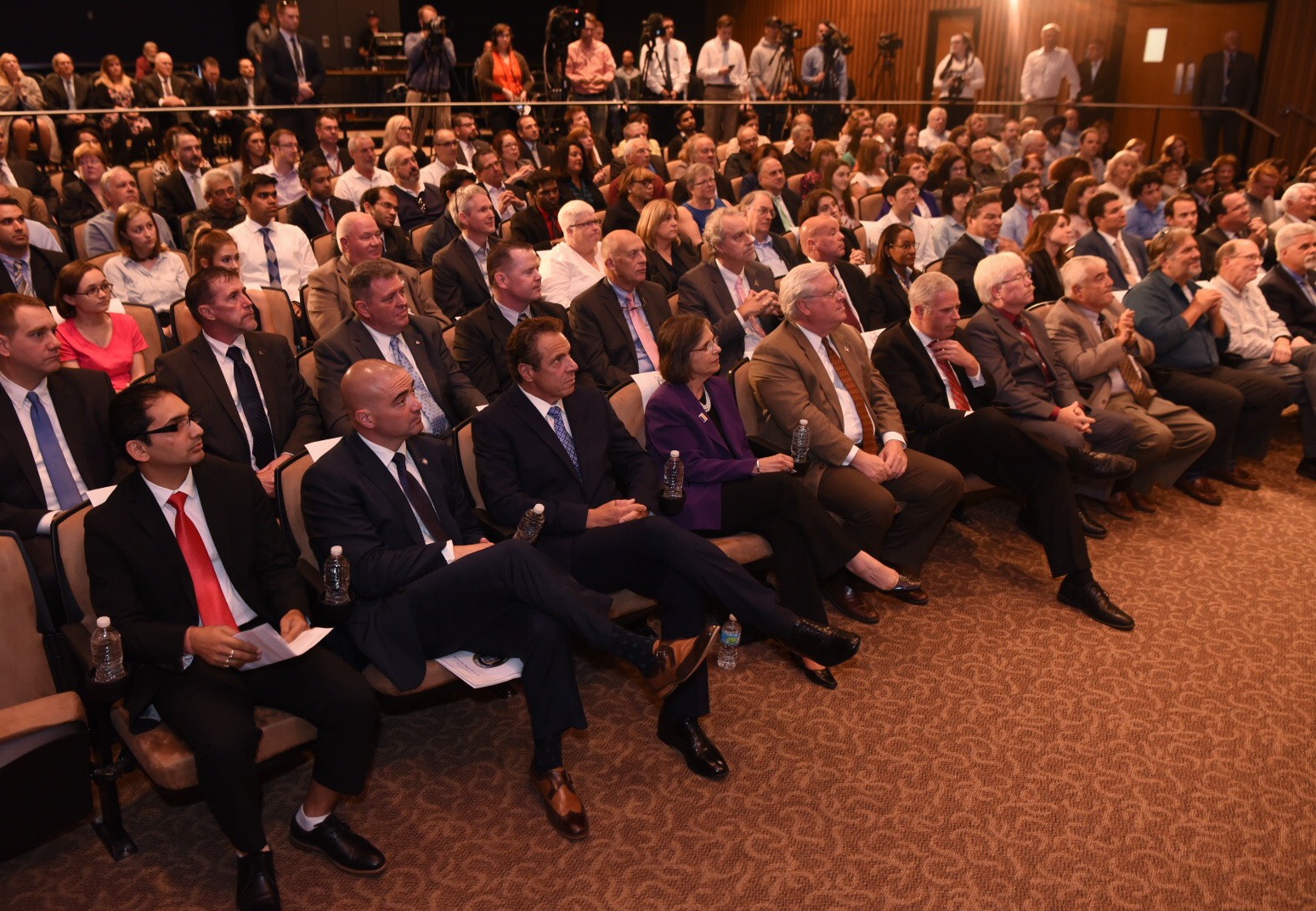
A consortium of 10 foreign and domestic companies is taking more than 10 years of Binghamton University research and commercializing a new generation of lithium-ion batteries that offer extended life and more stored power.Though the product and technology has been proven following years of testing, the major effort lies ahead as this start-up transforms from a research and development operation to an established enterprise selling a finished product commercially.
Plans are big. By the end of 2019, the newly formed Imperium3 New York expects to employ 230 workers overseeing the production of 700 batteries each minute in 400,000-square feet of vacant manufacturing on the former IBM-Endicott campus. The project hopes to employ 1,000 or more people as the market develops.Gov. Andrew Cuomo announced the project to about 160 invited guests Wednesday at the Endicott campus, saying Imperium will "breathe new life into vacant facilities," creating hundreds of new and value-added jobs for the beleaguered BInghamton economy.
"Endicott is certainly in need of a true victory, a victory that will put the village back to what it once was, a true legacy of research and development and production" said state Sen. Fred Akshar, R-Colesville.
Over the next two years, Imperium will invest an estimated $140 million into production equipment, and start training a workforce to oversee the exacting process necessary to assemble defect-free lithium-ion cells designed for use in the automotive industry and green energy projects.The man spearheading the effort, Shailesh Upreti, has been on the Binghamton University campus for 10 years, researching advances in lithium-ion batteries under the guidance of Professor Stanley Whittingham, who has gained a worldwide reputation for his work in energy storage.
Upreti's early work has gained notice not only from the state's energy research agency, which awarded him $500,000 as part of an effort to jumpstart new technologies on the Binghamton campus, but also drew attention from an Australian company that is a major supplier of lithium-ion batter components.Consortium directors selected the Endicott site for it fledgling enterprise because it has the infrastructure necessary to support production, and is in close proximity to production partners: C&D Assembly in Groton, which will produce electronic board assemblies and battery testing; Primet Precision Material of Ithaca, which is offering advanced processing materials; and Kodak in Rochester, among others.
Imperium is the first to graduate from Binghamton's Start-Up NY program with plans to expand from a fledgling enterprise into a promising business with a sizable investment from established outside investors.New York will assist the project with performance-based incentives: a $4.5 million Upstate Revitalization Initiative grant and $3.5 million in tax credits. Based on projected capital investments, the company is expected to also qualify for an estimated $5.85 million in state investment tax credits.
"On the campus of yesterday, you are going to see the industry of tomorrow," Cuomo said.Occupancy of 400,000-square-feet by Imperium represents the largest industrial location win for the owners of the former IBM campus since it landed the new BAE quarters when the company was forced to relocate from Westover following the September 2011 flood.Wednesday's announcement also serves as a boost to the region's struggling manufacturing sector, which has been in a 30-year long decline. The Binghamton area, which once supported more than 40,000 manufacturing jobs including 11,000 at IBM-Endicott, now has slightly more than 10,000 in the production category.
Charge CCCV, or C4V, the company with the intellctural property that serves as the core for Imperium, has patented and refined methods of storing renewable energy and a method of extending the life of lithium-ion batteries.The company uses groundbreaking research of Whittingham, whose work in the field of lithium-ion batteries has garnered worldwide recognition.
Binghamton University President Harvey Stenger, who was unable to attend the announcement because of a previous personal commitment, has previously characterized Whittingham's work as innovative, with the potential to produce commercial offspring in the Southern Tier with significant growth and employment potential.
The developing stages of C4V began in 2010, with the company filing for its first patent in 2012. Upreti and his team have been developing two core technologies that can be used in future generations of electric cars and utilize solar power, wind power or any place energy is stored. For the more than a year, Upreti's company has been occupying austere offices in Binghamton University's Innovative Technology Center, with a testing lab in the basement.
Upreti has previously said C4V has two large contracts, is working with four local companies and has also licensed technology to a few companies."Our primary goal has been, from day one, to set up an entire manufacturing ecosystem in New York, basically in this Southern Tier region," Upreti said in a previous interview.
Economic developers and owners of the $4 million-square-foot former IBM campus, with some structures 100 years old, have been trying to lure tenants for 17 years, since IBM abandoned the site and sold its local circuit board production unit and the expansive property to local investors. Upreti arrived at BU 11 years ago from India to complete his post-doctorate work alongside Whittingham, a distinguished professor in chemistry and materials science and engineering at the university. Whittingham helped advise Upreti and co-founder Mark Mecenas in developing C4V.
Whittingham joined the BU faculty in 1988 after spending 12 years with Exxon Research & Engineering Co. and four years with Schlumberger. Whittingham, an Oxford-trained chemist, holds 16 patents and is head of the university's Institute for Materials Research.

